Analyzing Professional Issues in Information Systems and Ethics
VerifiedAdded on 2022/12/15
|7
|1495
|71
Report
AI Summary
This report examines professional issues in information systems, emphasizing the ethical considerations that arise with technological advancements. It explores the significance of ethics in information systems, discussing the impact of technology on human behavior and the creation of new ethical dilemmas such as data privacy and piracy. The report delves into the concept of ethical codes, using the Association for Computing Machinery (ACM) code as an example, and highlights the importance of guidelines for professional conduct. It further analyzes the relationship between laws and ethical codes, specifically referencing the Computer Fraud and Abuse Act and the Computer Misuse Act, along with other relevant legislation. The conclusion underscores the critical role of ethics in organizations and the necessity of strict measures to prevent violations of ethical and moral codes within the realm of information technology.
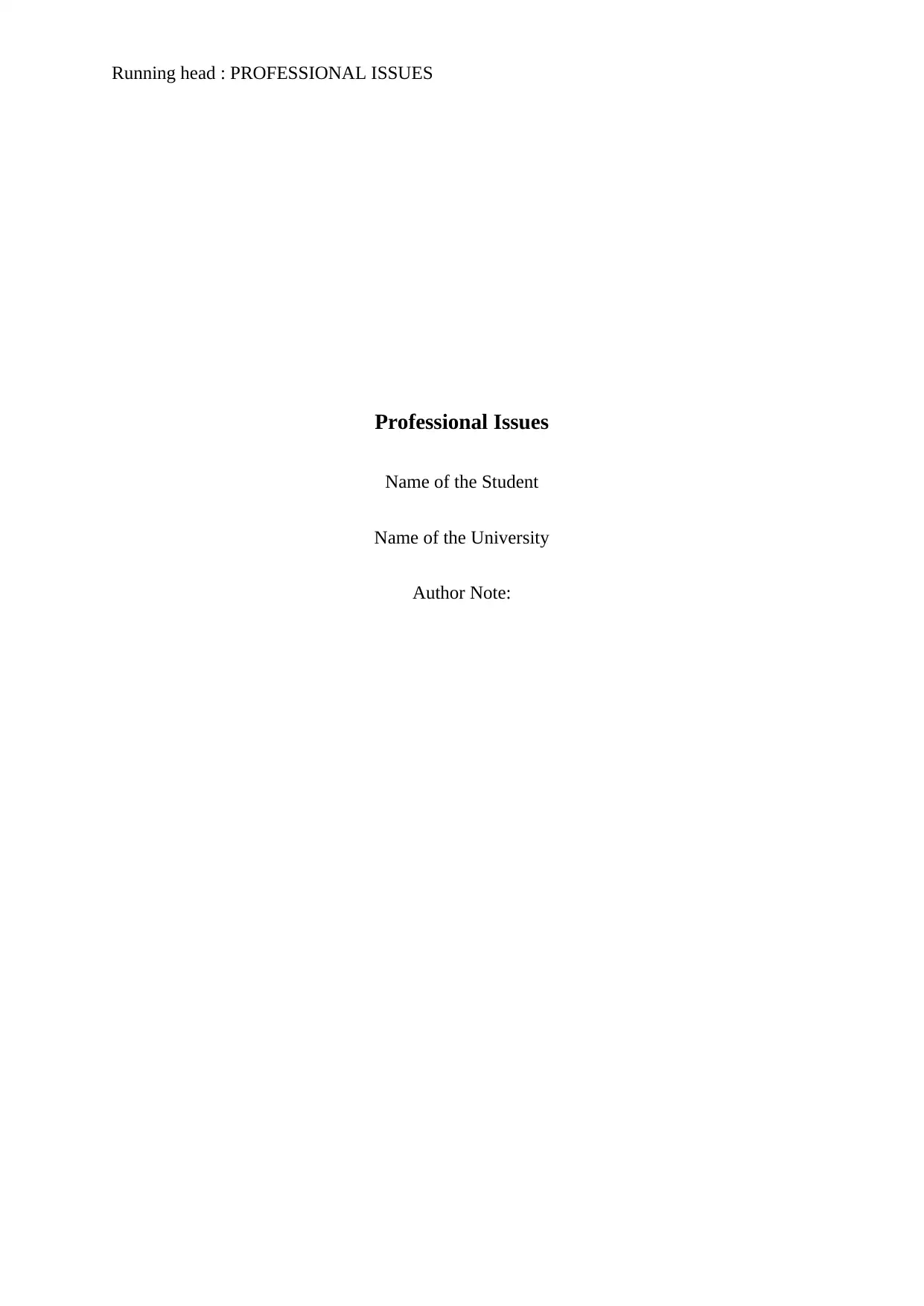
Running head : PROFESSIONAL ISSUES
Professional Issues
Name of the Student
Name of the University
Author Note:
Professional Issues
Name of the Student
Name of the University
Author Note:
Paraphrase This Document
Need a fresh take? Get an instant paraphrase of this document with our AI Paraphraser
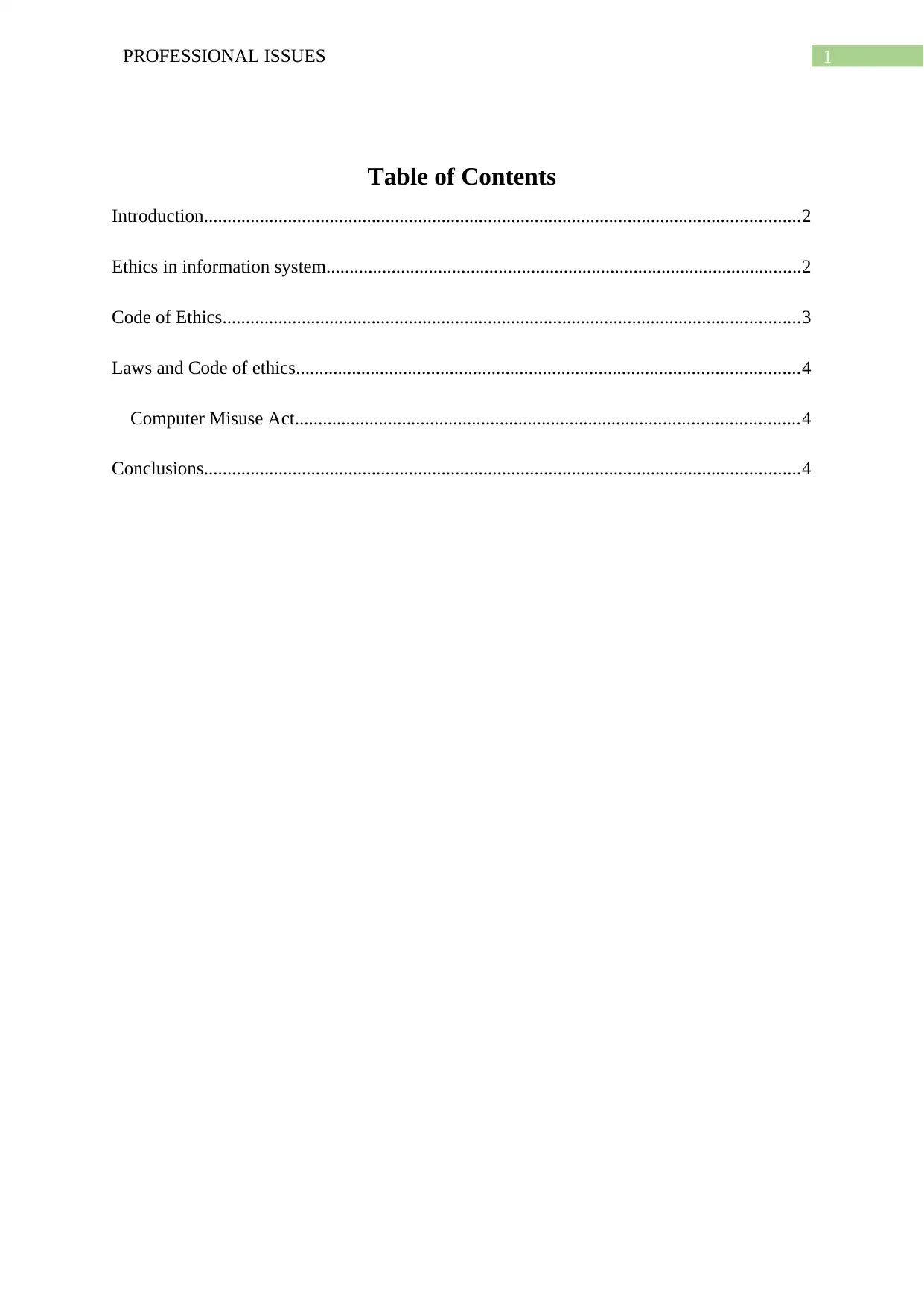
1PROFESSIONAL ISSUES
Table of Contents
Introduction................................................................................................................................2
Ethics in information system......................................................................................................2
Code of Ethics............................................................................................................................3
Laws and Code of ethics............................................................................................................4
Computer Misuse Act............................................................................................................4
Conclusions................................................................................................................................4
Table of Contents
Introduction................................................................................................................................2
Ethics in information system......................................................................................................2
Code of Ethics............................................................................................................................3
Laws and Code of ethics............................................................................................................4
Computer Misuse Act............................................................................................................4
Conclusions................................................................................................................................4
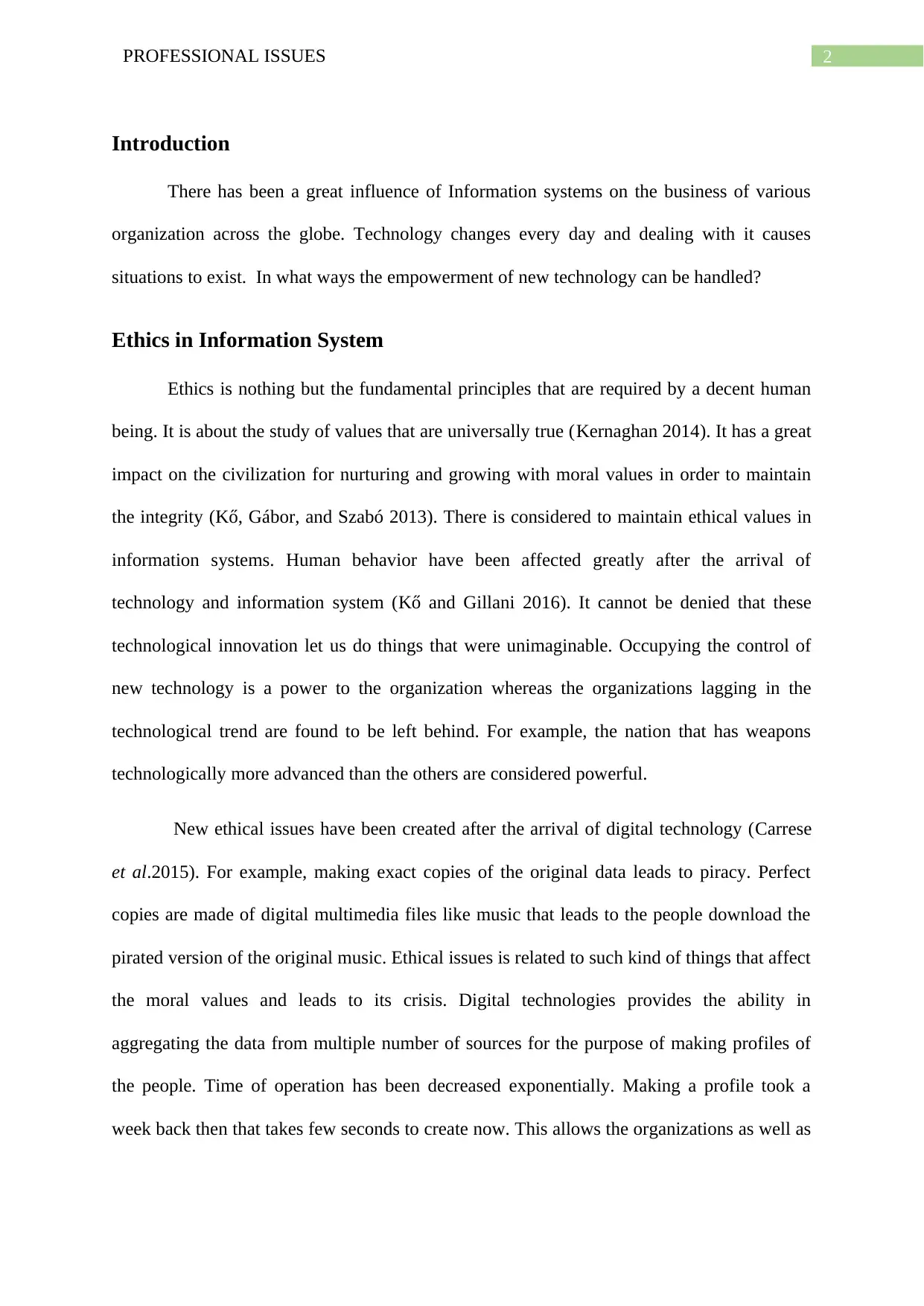
2PROFESSIONAL ISSUES
Introduction
There has been a great influence of Information systems on the business of various
organization across the globe. Technology changes every day and dealing with it causes
situations to exist. In what ways the empowerment of new technology can be handled?
Ethics in Information System
Ethics is nothing but the fundamental principles that are required by a decent human
being. It is about the study of values that are universally true (Kernaghan 2014). It has a great
impact on the civilization for nurturing and growing with moral values in order to maintain
the integrity (Kő, Gábor, and Szabó 2013). There is considered to maintain ethical values in
information systems. Human behavior have been affected greatly after the arrival of
technology and information system (Kő and Gillani 2016). It cannot be denied that these
technological innovation let us do things that were unimaginable. Occupying the control of
new technology is a power to the organization whereas the organizations lagging in the
technological trend are found to be left behind. For example, the nation that has weapons
technologically more advanced than the others are considered powerful.
New ethical issues have been created after the arrival of digital technology (Carrese
et al.2015). For example, making exact copies of the original data leads to piracy. Perfect
copies are made of digital multimedia files like music that leads to the people download the
pirated version of the original music. Ethical issues is related to such kind of things that affect
the moral values and leads to its crisis. Digital technologies provides the ability in
aggregating the data from multiple number of sources for the purpose of making profiles of
the people. Time of operation has been decreased exponentially. Making a profile took a
week back then that takes few seconds to create now. This allows the organizations as well as
Introduction
There has been a great influence of Information systems on the business of various
organization across the globe. Technology changes every day and dealing with it causes
situations to exist. In what ways the empowerment of new technology can be handled?
Ethics in Information System
Ethics is nothing but the fundamental principles that are required by a decent human
being. It is about the study of values that are universally true (Kernaghan 2014). It has a great
impact on the civilization for nurturing and growing with moral values in order to maintain
the integrity (Kő, Gábor, and Szabó 2013). There is considered to maintain ethical values in
information systems. Human behavior have been affected greatly after the arrival of
technology and information system (Kő and Gillani 2016). It cannot be denied that these
technological innovation let us do things that were unimaginable. Occupying the control of
new technology is a power to the organization whereas the organizations lagging in the
technological trend are found to be left behind. For example, the nation that has weapons
technologically more advanced than the others are considered powerful.
New ethical issues have been created after the arrival of digital technology (Carrese
et al.2015). For example, making exact copies of the original data leads to piracy. Perfect
copies are made of digital multimedia files like music that leads to the people download the
pirated version of the original music. Ethical issues is related to such kind of things that affect
the moral values and leads to its crisis. Digital technologies provides the ability in
aggregating the data from multiple number of sources for the purpose of making profiles of
the people. Time of operation has been decreased exponentially. Making a profile took a
week back then that takes few seconds to create now. This allows the organizations as well as
⊘ This is a preview!⊘
Do you want full access?
Subscribe today to unlock all pages.

Trusted by 1+ million students worldwide
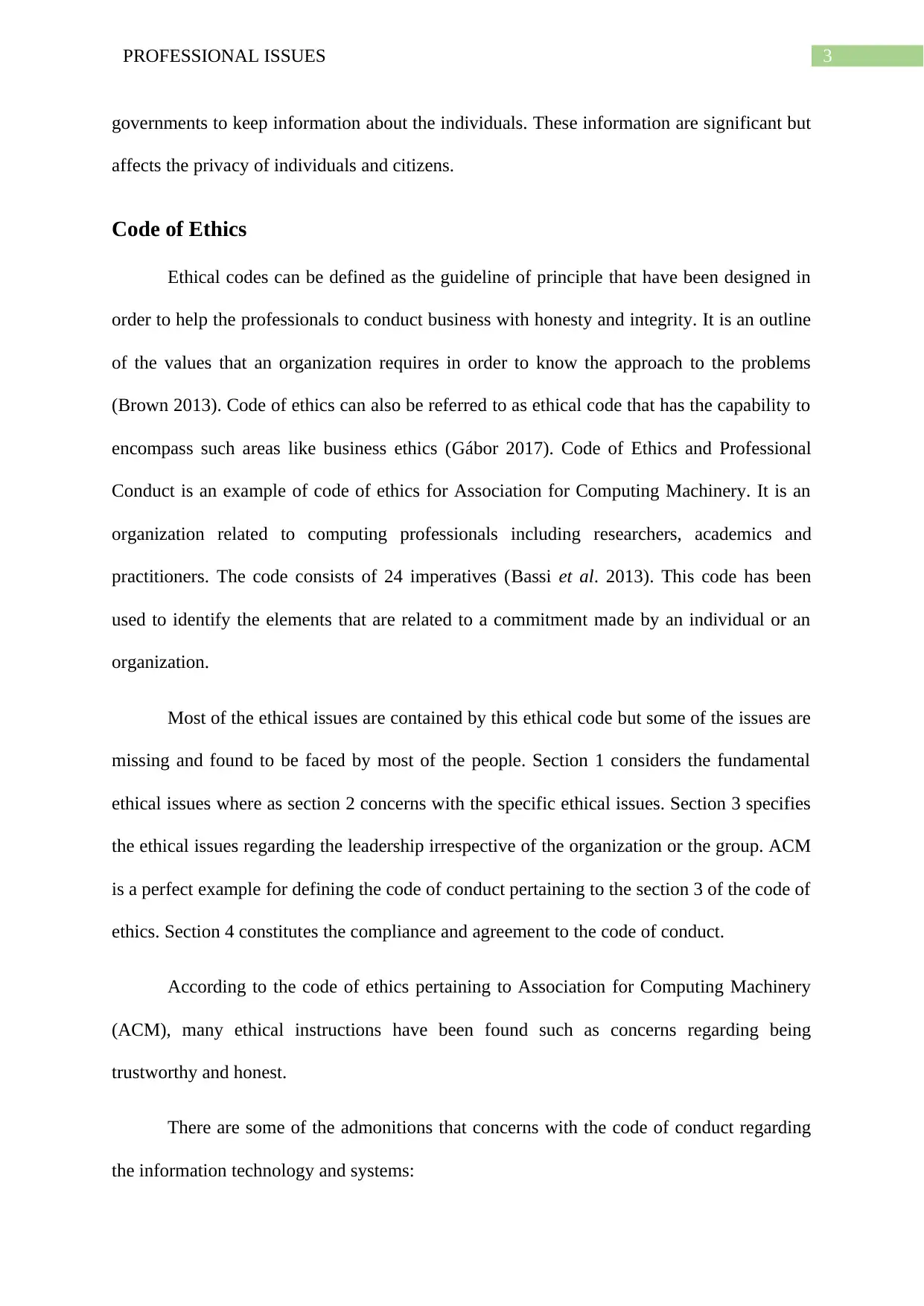
3PROFESSIONAL ISSUES
governments to keep information about the individuals. These information are significant but
affects the privacy of individuals and citizens.
Code of Ethics
Ethical codes can be defined as the guideline of principle that have been designed in
order to help the professionals to conduct business with honesty and integrity. It is an outline
of the values that an organization requires in order to know the approach to the problems
(Brown 2013). Code of ethics can also be referred to as ethical code that has the capability to
encompass such areas like business ethics (Gábor 2017). Code of Ethics and Professional
Conduct is an example of code of ethics for Association for Computing Machinery. It is an
organization related to computing professionals including researchers, academics and
practitioners. The code consists of 24 imperatives (Bassi et al. 2013). This code has been
used to identify the elements that are related to a commitment made by an individual or an
organization.
Most of the ethical issues are contained by this ethical code but some of the issues are
missing and found to be faced by most of the people. Section 1 considers the fundamental
ethical issues where as section 2 concerns with the specific ethical issues. Section 3 specifies
the ethical issues regarding the leadership irrespective of the organization or the group. ACM
is a perfect example for defining the code of conduct pertaining to the section 3 of the code of
ethics. Section 4 constitutes the compliance and agreement to the code of conduct.
According to the code of ethics pertaining to Association for Computing Machinery
(ACM), many ethical instructions have been found such as concerns regarding being
trustworthy and honest.
There are some of the admonitions that concerns with the code of conduct regarding
the information technology and systems:
governments to keep information about the individuals. These information are significant but
affects the privacy of individuals and citizens.
Code of Ethics
Ethical codes can be defined as the guideline of principle that have been designed in
order to help the professionals to conduct business with honesty and integrity. It is an outline
of the values that an organization requires in order to know the approach to the problems
(Brown 2013). Code of ethics can also be referred to as ethical code that has the capability to
encompass such areas like business ethics (Gábor 2017). Code of Ethics and Professional
Conduct is an example of code of ethics for Association for Computing Machinery. It is an
organization related to computing professionals including researchers, academics and
practitioners. The code consists of 24 imperatives (Bassi et al. 2013). This code has been
used to identify the elements that are related to a commitment made by an individual or an
organization.
Most of the ethical issues are contained by this ethical code but some of the issues are
missing and found to be faced by most of the people. Section 1 considers the fundamental
ethical issues where as section 2 concerns with the specific ethical issues. Section 3 specifies
the ethical issues regarding the leadership irrespective of the organization or the group. ACM
is a perfect example for defining the code of conduct pertaining to the section 3 of the code of
ethics. Section 4 constitutes the compliance and agreement to the code of conduct.
According to the code of ethics pertaining to Association for Computing Machinery
(ACM), many ethical instructions have been found such as concerns regarding being
trustworthy and honest.
There are some of the admonitions that concerns with the code of conduct regarding
the information technology and systems:
Paraphrase This Document
Need a fresh take? Get an instant paraphrase of this document with our AI Paraphraser
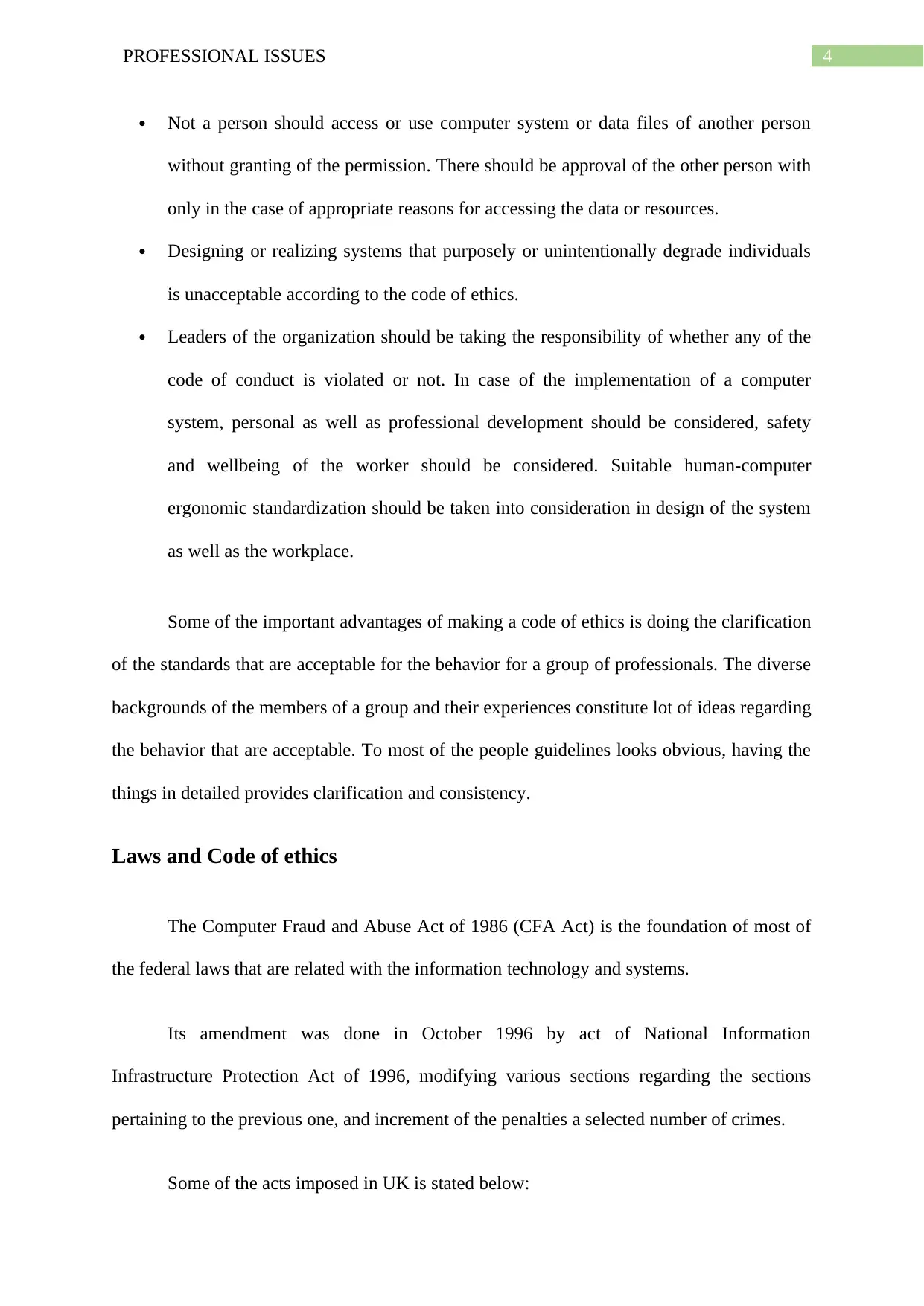
4PROFESSIONAL ISSUES
Not a person should access or use computer system or data files of another person
without granting of the permission. There should be approval of the other person with
only in the case of appropriate reasons for accessing the data or resources.
Designing or realizing systems that purposely or unintentionally degrade individuals
is unacceptable according to the code of ethics.
Leaders of the organization should be taking the responsibility of whether any of the
code of conduct is violated or not. In case of the implementation of a computer
system, personal as well as professional development should be considered, safety
and wellbeing of the worker should be considered. Suitable human-computer
ergonomic standardization should be taken into consideration in design of the system
as well as the workplace.
Some of the important advantages of making a code of ethics is doing the clarification
of the standards that are acceptable for the behavior for a group of professionals. The diverse
backgrounds of the members of a group and their experiences constitute lot of ideas regarding
the behavior that are acceptable. To most of the people guidelines looks obvious, having the
things in detailed provides clarification and consistency.
Laws and Code of ethics
The Computer Fraud and Abuse Act of 1986 (CFA Act) is the foundation of most of
the federal laws that are related with the information technology and systems.
Its amendment was done in October 1996 by act of National Information
Infrastructure Protection Act of 1996, modifying various sections regarding the sections
pertaining to the previous one, and increment of the penalties a selected number of crimes.
Some of the acts imposed in UK is stated below:
Not a person should access or use computer system or data files of another person
without granting of the permission. There should be approval of the other person with
only in the case of appropriate reasons for accessing the data or resources.
Designing or realizing systems that purposely or unintentionally degrade individuals
is unacceptable according to the code of ethics.
Leaders of the organization should be taking the responsibility of whether any of the
code of conduct is violated or not. In case of the implementation of a computer
system, personal as well as professional development should be considered, safety
and wellbeing of the worker should be considered. Suitable human-computer
ergonomic standardization should be taken into consideration in design of the system
as well as the workplace.
Some of the important advantages of making a code of ethics is doing the clarification
of the standards that are acceptable for the behavior for a group of professionals. The diverse
backgrounds of the members of a group and their experiences constitute lot of ideas regarding
the behavior that are acceptable. To most of the people guidelines looks obvious, having the
things in detailed provides clarification and consistency.
Laws and Code of ethics
The Computer Fraud and Abuse Act of 1986 (CFA Act) is the foundation of most of
the federal laws that are related with the information technology and systems.
Its amendment was done in October 1996 by act of National Information
Infrastructure Protection Act of 1996, modifying various sections regarding the sections
pertaining to the previous one, and increment of the penalties a selected number of crimes.
Some of the acts imposed in UK is stated below:
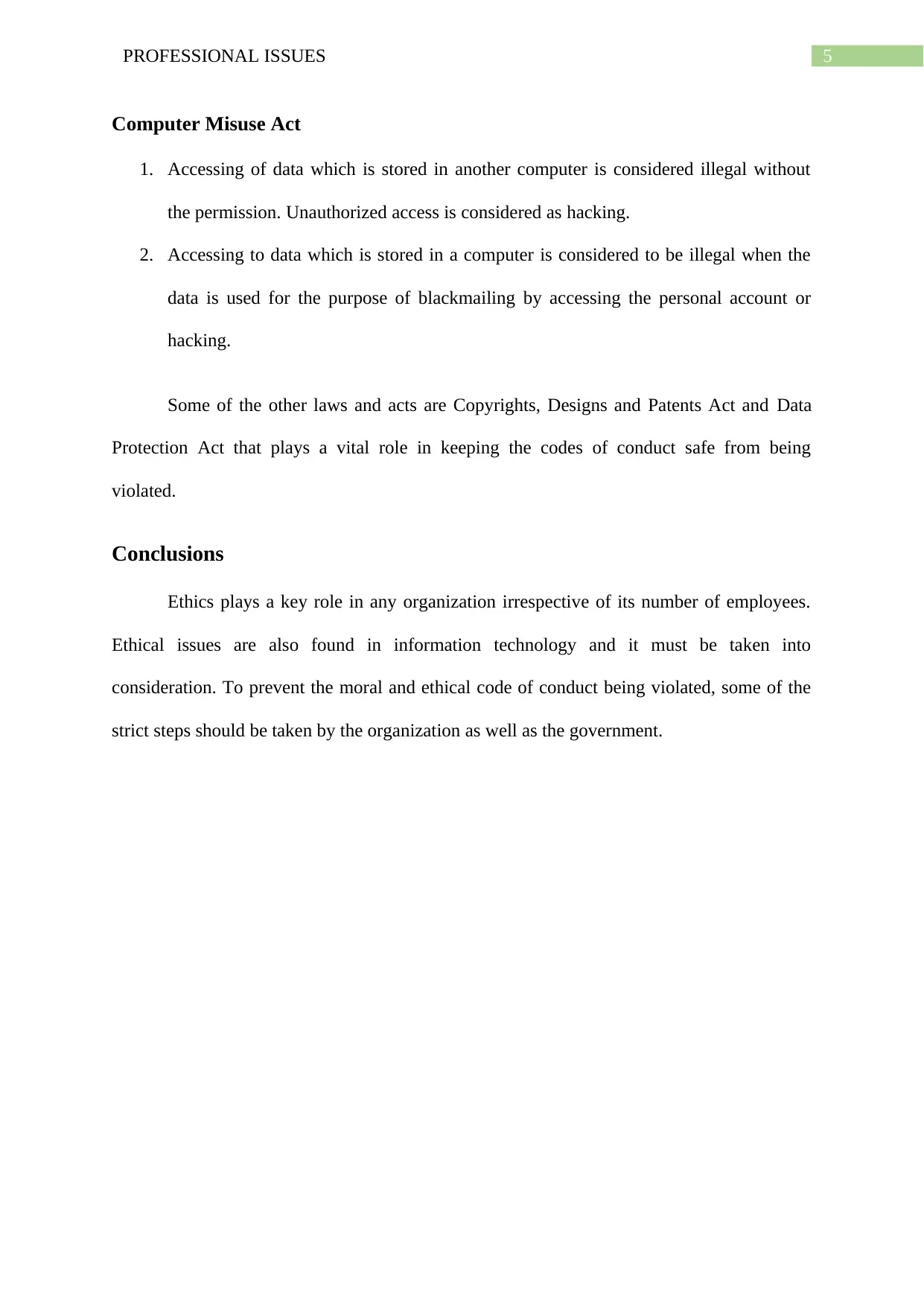
5PROFESSIONAL ISSUES
Computer Misuse Act
1. Accessing of data which is stored in another computer is considered illegal without
the permission. Unauthorized access is considered as hacking.
2. Accessing to data which is stored in a computer is considered to be illegal when the
data is used for the purpose of blackmailing by accessing the personal account or
hacking.
Some of the other laws and acts are Copyrights, Designs and Patents Act and Data
Protection Act that plays a vital role in keeping the codes of conduct safe from being
violated.
Conclusions
Ethics plays a key role in any organization irrespective of its number of employees.
Ethical issues are also found in information technology and it must be taken into
consideration. To prevent the moral and ethical code of conduct being violated, some of the
strict steps should be taken by the organization as well as the government.
Computer Misuse Act
1. Accessing of data which is stored in another computer is considered illegal without
the permission. Unauthorized access is considered as hacking.
2. Accessing to data which is stored in a computer is considered to be illegal when the
data is used for the purpose of blackmailing by accessing the personal account or
hacking.
Some of the other laws and acts are Copyrights, Designs and Patents Act and Data
Protection Act that plays a vital role in keeping the codes of conduct safe from being
violated.
Conclusions
Ethics plays a key role in any organization irrespective of its number of employees.
Ethical issues are also found in information technology and it must be taken into
consideration. To prevent the moral and ethical code of conduct being violated, some of the
strict steps should be taken by the organization as well as the government.
⊘ This is a preview!⊘
Do you want full access?
Subscribe today to unlock all pages.

Trusted by 1+ million students worldwide
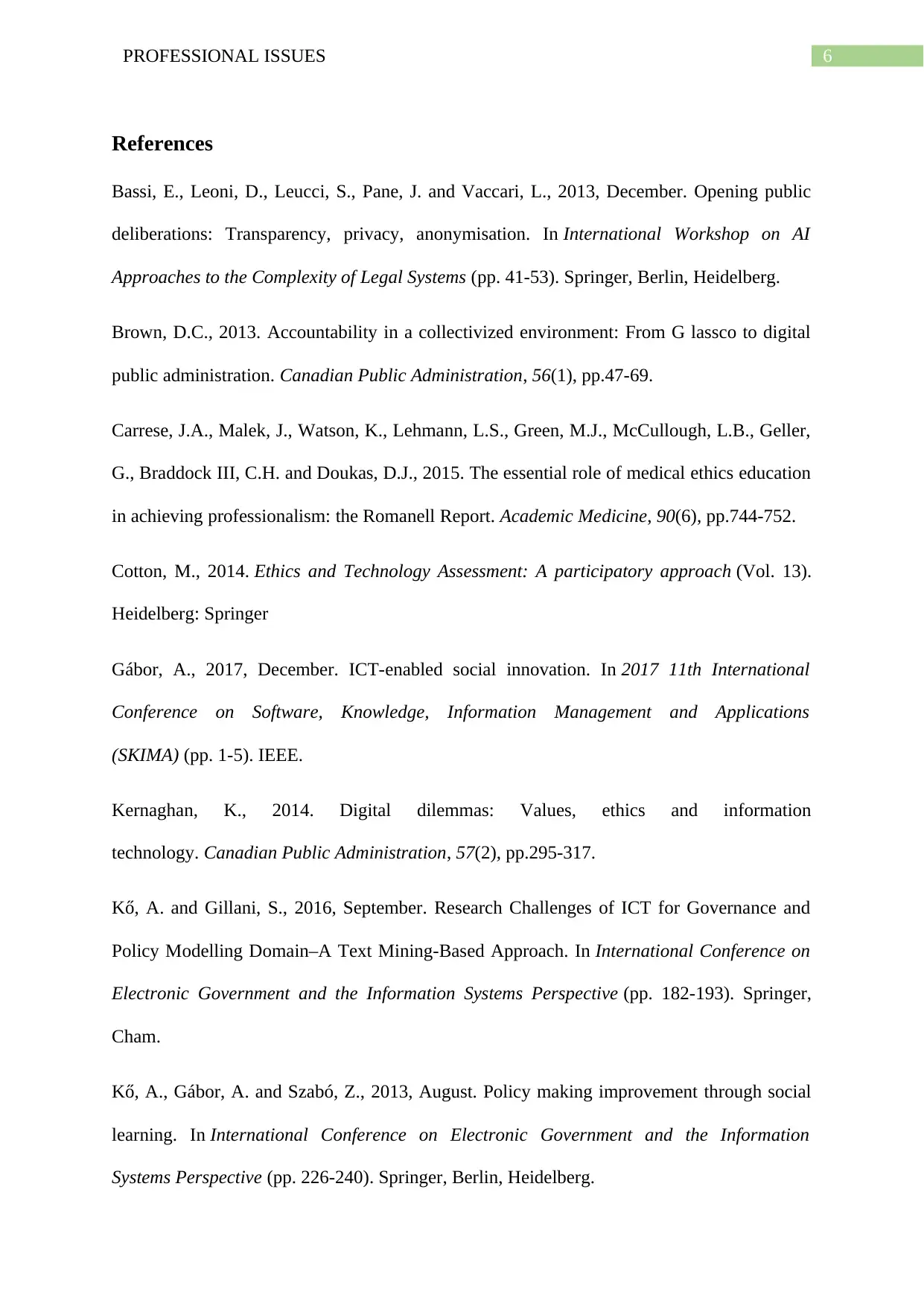
6PROFESSIONAL ISSUES
References
Bassi, E., Leoni, D., Leucci, S., Pane, J. and Vaccari, L., 2013, December. Opening public
deliberations: Transparency, privacy, anonymisation. In International Workshop on AI
Approaches to the Complexity of Legal Systems (pp. 41-53). Springer, Berlin, Heidelberg.
Brown, D.C., 2013. Accountability in a collectivized environment: From G lassco to digital
public administration. Canadian Public Administration, 56(1), pp.47-69.
Carrese, J.A., Malek, J., Watson, K., Lehmann, L.S., Green, M.J., McCullough, L.B., Geller,
G., Braddock III, C.H. and Doukas, D.J., 2015. The essential role of medical ethics education
in achieving professionalism: the Romanell Report. Academic Medicine, 90(6), pp.744-752.
Cotton, M., 2014. Ethics and Technology Assessment: A participatory approach (Vol. 13).
Heidelberg: Springer
Gábor, A., 2017, December. ICT-enabled social innovation. In 2017 11th International
Conference on Software, Knowledge, Information Management and Applications
(SKIMA) (pp. 1-5). IEEE.
Kernaghan, K., 2014. Digital dilemmas: Values, ethics and information
technology. Canadian Public Administration, 57(2), pp.295-317.
Kő, A. and Gillani, S., 2016, September. Research Challenges of ICT for Governance and
Policy Modelling Domain–A Text Mining-Based Approach. In International Conference on
Electronic Government and the Information Systems Perspective (pp. 182-193). Springer,
Cham.
Kő, A., Gábor, A. and Szabó, Z., 2013, August. Policy making improvement through social
learning. In International Conference on Electronic Government and the Information
Systems Perspective (pp. 226-240). Springer, Berlin, Heidelberg.
References
Bassi, E., Leoni, D., Leucci, S., Pane, J. and Vaccari, L., 2013, December. Opening public
deliberations: Transparency, privacy, anonymisation. In International Workshop on AI
Approaches to the Complexity of Legal Systems (pp. 41-53). Springer, Berlin, Heidelberg.
Brown, D.C., 2013. Accountability in a collectivized environment: From G lassco to digital
public administration. Canadian Public Administration, 56(1), pp.47-69.
Carrese, J.A., Malek, J., Watson, K., Lehmann, L.S., Green, M.J., McCullough, L.B., Geller,
G., Braddock III, C.H. and Doukas, D.J., 2015. The essential role of medical ethics education
in achieving professionalism: the Romanell Report. Academic Medicine, 90(6), pp.744-752.
Cotton, M., 2014. Ethics and Technology Assessment: A participatory approach (Vol. 13).
Heidelberg: Springer
Gábor, A., 2017, December. ICT-enabled social innovation. In 2017 11th International
Conference on Software, Knowledge, Information Management and Applications
(SKIMA) (pp. 1-5). IEEE.
Kernaghan, K., 2014. Digital dilemmas: Values, ethics and information
technology. Canadian Public Administration, 57(2), pp.295-317.
Kő, A. and Gillani, S., 2016, September. Research Challenges of ICT for Governance and
Policy Modelling Domain–A Text Mining-Based Approach. In International Conference on
Electronic Government and the Information Systems Perspective (pp. 182-193). Springer,
Cham.
Kő, A., Gábor, A. and Szabó, Z., 2013, August. Policy making improvement through social
learning. In International Conference on Electronic Government and the Information
Systems Perspective (pp. 226-240). Springer, Berlin, Heidelberg.
1 out of 7
Related Documents
Your All-in-One AI-Powered Toolkit for Academic Success.
+13062052269
info@desklib.com
Available 24*7 on WhatsApp / Email
![[object Object]](/_next/static/media/star-bottom.7253800d.svg)
Unlock your academic potential
Copyright © 2020–2026 A2Z Services. All Rights Reserved. Developed and managed by ZUCOL.





